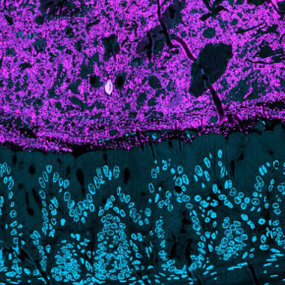The intestinal microbiota provides a natural barrier against pathogenic bacteria.
Scientists from our laboratory (BSC | CNRS Unistra) participated in a study led by the University of Oxford, published in the journal Science, to demonstrate that the mechanism of this resistance mainly involves the blocking by a set of species present in the microbiota of the nutrients required by pathogenic bacteria.
The diversity of symbiotic bacteria with the organism is crucial for its resistance to pathogens. In this study, the scientists carried out in vitro and in vivo tests on gnotobiotic mice (mice devoid of microbiota) in order to determine the factors essential to this resistance. The latter was examined individually, that is to say by examining the individual response of the symbionts to the two pathogens. They were thus able to classify them in a podium according to their capacity to confer resistance. More than 100 symbionts were thus studied. This first study shows that even the most efficient species offered limited protection against pathogens. On the other hand, when symbionts were grouped into diverse communities of up to 50 species, resistance to pathogens was even more effective. As a result, ecological diversity appeared to be a crucial factor for resistance to colonization.
For more information, read the news published on the CNRS Biology website.
Article :
Spragge F, Bakkeren E, Jahn MT, B N Araujo E, Pearson CF, Wang X, Pankhurst L, Cunrath O*, Foster KR* (2023). Microbiome Diversity Protects against Pathogens by Nutrient Blocking. Science 382(6676):eadj3502. doi:10.1126/science.adj3502.



